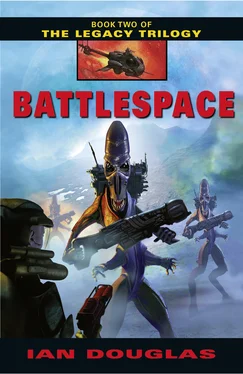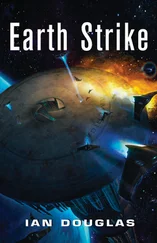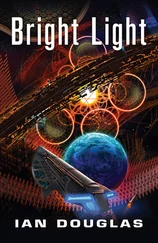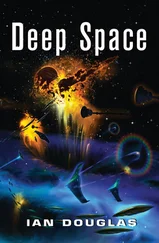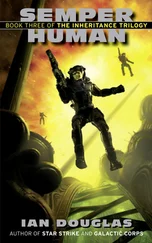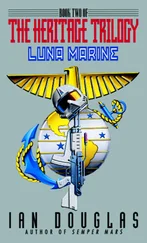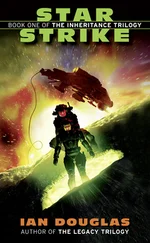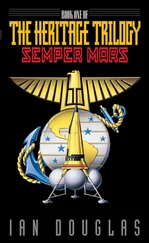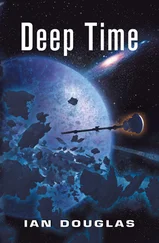Again, low-voiced murmurs sounded in the room. By now, every man and woman in the room had heard about the watchdog program that had taken out six of their number the other night at the condecology in ELA, and they didn’t like it, not one bit.
“I don’t know about all of you,” Dunne added, “but I’m gonna be damned glad to get back out there!”
“We’re with you, Gunny!” Corporal Bryan called out, using Dunne’s new rank for the first time. It sounded a bit strange … but right .
“I’ve also been told to tell you,” Dunne went on, “that for those of you who stay with the MIEU, there will be an additional rank increase immediately upon returning. They’re also in the process of putting through a special payment incentive. The word is it’ll be fifty percent of your standard paycheck, above and beyond combat pay, hazardous-duty pay, and XS-duty pay.”
And that, Garroway thought, would come to a very nice sum. He took a quick moment to download the appropriate pay scale tables in his mind. Yeah … very sweet. As a corporal with over three years’ subjective in, his base pay would come to n$1724.80 per month. Fifty percent of that was an additional n$862 plus change per month. That, plus the bonus for hazardous duty, extrastellar duty, and combat …
He gave a mental whistle and wondered if that kind of money made the Marines into modern-day, high-tech mercenaries.
“Is that ob or sub, Gunny?” someone asked.
“Yeah,” someone else added with a laugh. “It does make a difference!”
“Strictly subjective time, people, just like your base pay.” There were groans in response. “Can it!” Dunne added. “It’s bad enough the government pays you while you’re sleeping your sorry lives away in cybehibe! They’re not paying you for time that shrinks to no time at all while you’re traveling at near- c !
“Any other questions?” There were none. “Carry on,” Dunne said, leaving the Marines to discuss the news.
A few—Sergeant, now Staff Sergeant, Houston and Corporal, now Sergeant, Matt Cavaco—felt that arbitrarily ordering the Marines to go to Sirius, rather than making it a volunteer-only mission—was just flat wrong. Most, though, were excited by the prospect, both for the extra pay, and because of the distinct alienation many of them were feeling from Earth. Those few who’d gotten passes to go ashore in the past few days had returned with less than happy news about the planet, and about its inhabitants. Damn, but Dunne was right. The background culture of North America had changed and in some unpleasant ways.
There was a lot else about the local scene Dunne had not mentioned, but the other Marines in the company had been discussing it endlessly for the past several days.
It wasn’t just the shifting jargon and language, the strange new religions and philosophies, or the everchanging buzz about numnum persies or zaggers, whatever the hell those were. Where to begin?
Politics were one issue. The voices calling for separation were louder, more strident, than ever. Aztlanistas had been calling for independence since well before Garroway had been born, but the debate now approached open warfare in some of the Latino slums of LA, and in the borderlands of southern California, Arizona, New Mexico, and Texas. Strife was building with the Québecois, too, as the Canadian winters worsened. Their claim to western Pennsylvania and the Ohio Valley was less viable even than that of the Aztlanistas , since it had been the British Empire, not the United States of America, that had taken their old territories in the French and Indian Wars. Still, it made for amusing and often virulent name-calling on the public forums and news feeds.
There were more rules and regulations. Most states could now arrest and prosecute people for breaking one or another of the citizenship laws, dictums prohibiting any behavior that might disturb good social order and public decency. That sounded so much like the articles of the Uniform, Code of Military Justice—specifically the one about “conduct prejudicial to good order and discipline”—that some Marines were speculating that America was now a military state. And with far more convicted criminals than prison space, more and more felons were being turned loose with specially programmed watchdog nano injected into their bloodstreams, nano that could evaluate their behavior against certain narrow parameters and administer punishment—even death—in the event of a violation. That was police-state stuff.
Scary.
And there were other problems, some of them not man-made. The weather was worse, a lot worse, than when Garroway had left Earth twenty-one years ago. Sea levels were higher, ultraviolet in the sunlight harsher, storms bigger and more dangerous. Most major coastal cities—Washington, D.C., coastal Los Angeles, Miami, New Orleans—all were enclosed now by high thick seawalls, and at least partly covered over by transparent domes to keep out both the worsening ultraviolet and the periodic storm surges that otherwise would have flooded them completely. Despite that, there was serious talk about abandoning the original cores of those cities and rebuilding inland. Some coast cities, because of their terrain, could not be completely protected; New York City, San Francisco, and Seattle were in grave danger.
Manhattan, in particular, offered such a tangled and problematical geography with its rivers and associated borough-cities that the seawall and dome offered only partial protection. Fifteen years earlier, Hurricane Trevor had come ashore at the mouths of the Hudson and East rivers, causing tens of billions of newdollars’ damage. The next year, the state of New Jersey had, against riotous protests, finally moved the Statue of Liberty to artificial high ground near Secaucus before her copper body deteriorated any further.
Most forms of cancer were treatable through various nanomedical techniques—one did not go into direct sunlight any longer without nanotechnical augmentation to eyes and skin!—but skin cancer in particular cost Americans tens of billions per year in both treatment and prophylaxis.
And the ongoing deterioration of the planet’s climate appeared to be accelerating. Temperatures in the equatorial zones were rising steadily, fueling migrations of local populations to the north and south—but especially into the north. All across the globe, equatorial peoples were on the move as local government broke down and whole populations became migratory.
Scuttlebutt around the barracks had it that much of the furor over tracking down ancient alien technology among the stars was centered now on learning how to control climate on a planetary scale.
But was such an audacious goal even possible?
And then there were the religions. Always the religions. Dozens of new ones seemed to appear almost weekly, the majority of them either claiming the An were gods or that they were hell-born demons. Each new exoarcheological revelation on Earth, the Moon, Mars, or elsewhere seemed to spawn more ways of dividing humankind in the name of faith, peace, and spiritual brotherhood.
Established sects continued to splinter, sometimes violently. Within the Catholic world, Papessa and Anti-Pope continued to snipe at one another over issues ranging from how to think about the An to the use of nanomedical anagathics. Most Baptists believed the An were demonic; several new Baptist offshoots, however, continued to disagree on whether the An, like Lucifer, were fallen, or if Lucifer had somehow created them—an important theological question, since if they were fallen, then Christian missionaries sent to Ishtar might bring a few of that deluded race to the light.
Читать дальше
